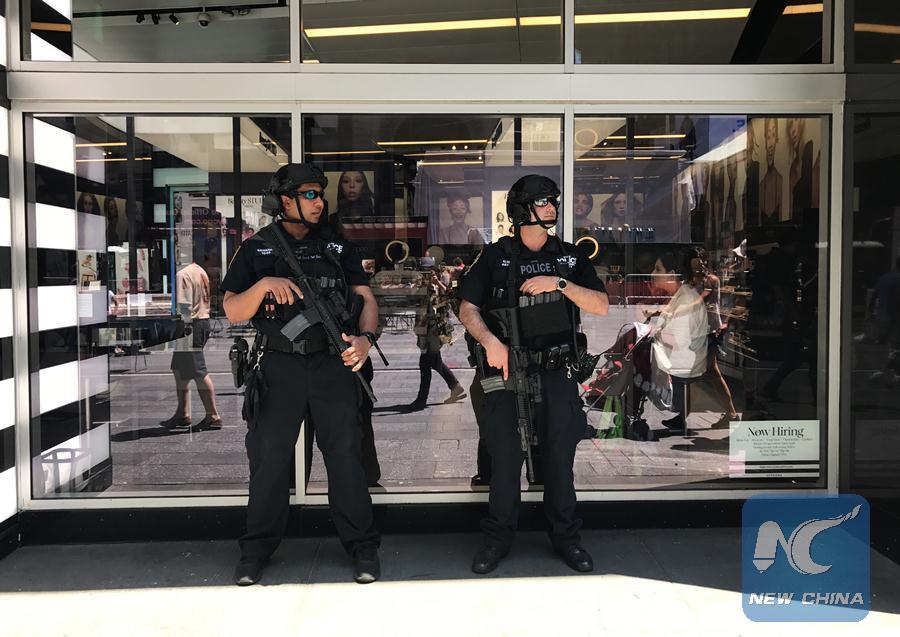
New York Police Department officers stand guard in Times Square, New York, the United States, June 12, 2017. (Xinhua/Wu Xiaojun)
By Matthew Rusling
WASHINGTON, June 13 (Xinhua) -- The U.S. is bracing for the next terror attack, as terror group Islamic State (IS) says it will ramp up attacks worldwide during the Muslim Ramadan holidays.
The terror group announced earlier this week that it was calling for more attacks around the world during the Ramadan season from May 26 to June 24 this year -- the most important holiday for Muslim nations worldwide.
The threat comes after the group has launched numerous attacks in recent years on targets worldwide. Those include the 2015 Paris attack that left 130 people dead, as well as attacks in Belgium, Indonesia and elsewhere.
The threat also comes on the one-year anniversary of the terror attacks in Orlando in the U.S. state of Florida. One year ago on Monday, a gunman who had pledged allegiance to IS opened fire on a packed gay nightclub, killing 49 people and leaving dozens more wounded.
"The end of Ramadan frequently has been targeted by Muslim extremist groups from al-Qaeda to IS for years, so attempted attacks are likely from the Islamic world through Europe to the U.S.," Wayne White, former deputy director of the State Department's Middle East Intelligence Office, told Xinhua.
White noted that U.S. federal intelligence and law enforcement agencies are ramping up intelligence collection, raising levels of alerts, and physical security.
"Most importantly, however, various state and local law enforcement authorities must follow Washington's lead by increasing information gathering, shadowing potential suspects, and upping their physical presence on the street," White said.
The United States has ramped up security in unforeseen ways since the terror attacks of Sept. 11, 2001, when radical Islamist group al-Qaeda launched an attack that killed nearly 3,000 people in New York and Washington.
Now, the threat is less from hijacking airplanes, the method used in the Sept. 11 attacks, but rather from threats such as running over pedestrians with cars, mass stabbings and shootings and other means.
"Any and all means are possible: vehicular, bombings, shootings, stabbings or combinations of these," he said.
Still, IS may hold back certain attacks, as security worldwide will be ramped up during the Ramadan holidays.
"Since IS and its acolytes know communities will now be far more alert, some attacks may be held back for less symbolic times when security will be less daunting," White said.
Alarmingly, there may be targets that are very difficult to protect, he said.
"Around the globe, including the U.S., IS still has access to a host of soft targets that simply cannot be shielded effectively by available resources," White added.
The United States, some experts argue, may have an advantage in protecting its citizens. While police cannot be everywhere at all times, many U.S. citizens are legally permitted to carry fire arms, which could thwart a terror attack.
But that may not be so simple.
"Some believe that many American civilians bearing arms gives the U.S. an advantage, but in confusion or crossfires associated with a terrorist attack, such individuals can accidentally shoot innocents, be shot by police mistaking them for attackers, or even have their guns seized by alerted attackers," White said.
Meanwhile, Trump continues to push for a temporary travel ban to the United States for citizens of a handful of nations rife with terrorism. While a lower court on Monday blocked the ban, the issue is expected to make its way to the Supreme Court.
Earlier this month, a major terror attack in London made global headlines, after Islamist terrorists carried out a strike on a crowded shopping area in London, using a van to plow through throngs of tourists and locals on London Bridge. Several men then jumped out of the van and went on a rampage, stabbing people with knives.
The incident, which left seven dead and four dozen injured, came just two weeks after a terrorist bomb killed nearly two dozen people at a concert in Manchester in central UK.
The attack caused Trump to double down on his calls for a travel ban from those nations. Critics said the ban will do little to curb the terror threat, as attacks can come from individuals living inside the United States.
Others have called for more surveillance of the Muslim community in the United States, and for efforts by law enforcement to gain the trust of American Muslims so that potential terrorists might more easily be identified.

